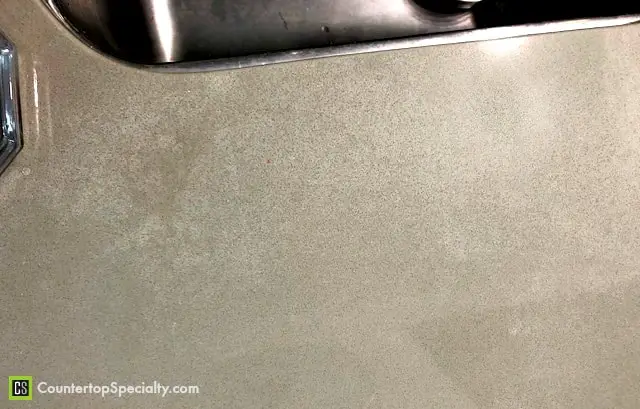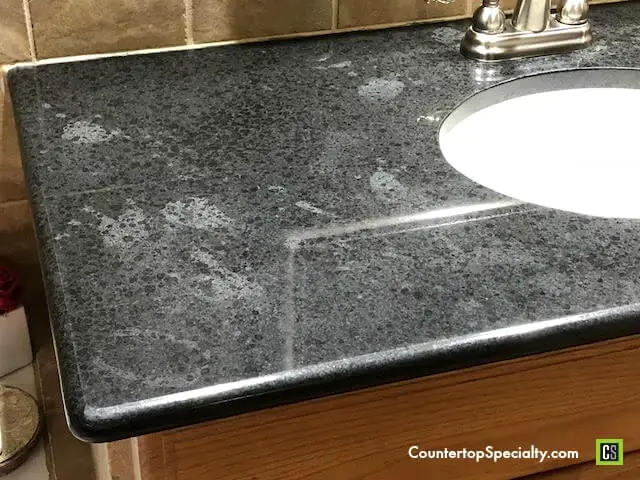Cloudy Blotches on Silestone Countertop
QUESTION:
We have a problem with our Silestone countertops.
It first started with a cloudy look underneath our drainboard. Now we have cloudy blotches in other spots!
The countertop is about 3 years old. The problem started after about one year.
We contacted Silestone numerous times. They came to our house and tried to rub it out-no good! They said it had to be something we did! No way!! They wouldn't stand behind their product.
What can we do? We are contemplating going with real granite. I told my wife we would have been better off with Formica! Help. Tom
ANSWER:
Stains in Silestone or any other quartz countertop occur just like stains in stone... a substance absorbs into the stone creating a dark spot. (Yes, quartz / Silestone can stain).
However, cloudy or light-colored marks on quartz countertops are usually from chemical damage and are permanent.
Related Content:Quartz Countertop Stains ExplainedThere isn't a good explanation why the countertop would suddenly change or "develop" a problem after a year.
All damage to any surface is due to something done to it.
Now, it may be that you didn't do anything that
should have damaged the surface or you may not have known that a particular behavior/habit could be damaging (very common).
It's also important to note that not all quartz countertops are of the same quality.
Even though the basic "recipe" for making quartz countertops is the same, each brand may use a variation with different percentages and quality of resins.
So, some brands of quartz countertops have problems, stains, or chemical reactions that may not occur on other brands of quartz.
Other Reasons For Quartz & Silestone Problems
Not every quartz countertop brand will suffer the same problems in the same way. But, in general...
Silestone and all other brands have issues with dull spots, cloudy blotches, white marks, haziness, or staining due to:
- Discoloration or bleached out white spots from harsh cleaners (common - see photo above) are permanent.
- Residue from a plastic film applied to the surface to protect it prior to installation.
- Manufacturing defects like white spots, lines, rough, spots, or anomalies in the color & pattern.
- Manufacturing defects in the surface finish (should be shiny but is dull - streaky).
- Unusual wearing down of surface finish.
- Color fading from sunlight exposure.
- Installers unwittingly using damaging chemicals.
- Glues used to install the countertops reacting with the resin. Not common but possible near seams, edges, sinks.
- Stain from certain foods or drinks like coffee or tea. White quartz countertops are most prone to food stains. Food stains are darker or the color of the staining substance.
- Heat can discolor or scorch quartz when setting hot pots on the surface, from using countertop cooking appliances, or even heat from a dishwasher.
Only a small percentage of all quartz countertops will have problems. But as a group, such problems are common enough.
No countertop material is perfect. All have faults.
So, when the cloudy blotches, haziness, roughness, streaks, or marks are apparent immediately after installation, it is likely due to a manufacturing defect, chemicals used by the installers, or the residue left from the protective plastic coating.
However, if the cloudy blotches, stains, or dullness occur after you've used the countertop, then likely it's due to a chemical or cleaner that is damaging to Silestone or most other quartz countertops.
How Do You Clean Cloudy Quartz Countertops?
Often it is difficult to determine the cause of cloudy Silestone or quartz countertops or know how to get stains out of Silestone.
However, the following products have proven to work
in some cases (except bleached out white spots from chemical damage = permanent).
For regular cleaning use a quality Quartz Countertop Cleaner to avoid damage and for a steak-free shine. Try this first on stains but if stubborn, then...
- Bar Keeper’s Friend is the most consistently successful removing cloudiness and stains.
The Bar Keeper’s Friend soft cream is less abrasive.
Note: Test first. Silestone is highly scratch-resistant but in rare cases, abrasives can dull quartz.
- Soft Scrub Oxi is much less abrasive than BKF so use this first if you're worried about scratching the surface. But it may not get a stain out.
- Magic Eraser can remove stains and blotchy appearance from protective film residue. It is abrasive. Test first.
- Gel-Gloss Polish can sometimes remove cloudiness as well.
- Diluted bleach (8 parts water / 1 part bleach) works for some spots (WARNING: this is a risky choice as bleach can permanently discolor most quartz countertops).
- Acetone is helpful for removing ink stains and sticky residues BUT can discolor quartz in some cases. Wash and rinse the area thoroughly after applying.
Important to note... depending on the quality of the quartz, some products are abrasive and may cause slight dullness when used.
You may remove a stain but the finish is now slightly dull. This is a potential tradeoff you must consider.
Always test products or solutions for cleaning cloudy Silestone or quartz stains in a more hidden area first.
And using a
non-abrasive scrub pad is always a good idea.
Silestone and quartz countertops are not supposed to scratch but in reality, it can happen.
It's the binding resin that is soft, not the hard quartz, that gets scratched leaving a dull area.
And in order to stop future damage, discoloration, or cloudy blotches, you need to be aware that it is almost certainly the result of something you are doing.
Even if the type of cleaner used or your habits are not supposed to damage Silestone or quartz... sometimes strange reactions occur.
City tap water can cause dull spots or cloudiness. Many treated city water supplies are slightly acidic and can etch certain countertop materials including Silestone and other quartz brands.
Etching on quartz countertops (dull spots from acidic substances)
should not occur as on marble, but it does happen on some quartz surfaces.
So, maybe the water or some type of soap or cleaner you are using (not all soaps are "mild").
Without knowing what types of products were used on the Silestone countertops, it's hard to say what caused it.
Related Content: Best Quartz Cleaning & Polishing Products If considering a change, then I recommend granite countertops.
Quartz manufacturers make a big issue about sealing granite, that Silestone has greater flexibility, Silestone countertops don't stain, etc.
Silestone and quartz countertops can stain. Sealing granite is not a big issue and not necessary on all granite countertops, flexibility is irrelevant.
That's not to say granite countertops are perfect. Granite has its own issues and requirements too.
Typical performance is nearly the same when comparing daily use of
Granite vs. Silestone or quartz countertop materials.
However, stains in granite can almost always be removed and most types of damage repaired where discoloration stains or other finish damage to quartz is often permanent.
Silestone and
engineered quartz countertops are still excellent, but repairability is a big advantage.
Cloudiness and Silestone problems don't happen in many cases, but when they do it's nice to have some options other than to live with it or tear it out.
FAQ's: Cloudy Blotches on Silestone Countertops
How do you fix dull spots on quartz?Honestly, repolishing dull spots on quartz is hit or miss. In some cases on quartz, this
Granite Polishing Kit works great.
How do you restore the shine to Silestone?The
Topical Granite & Marble Polish will protect and enhance the shine so it really pops.
Does Silestone fade in the sunlight?Yes, UV rays will cause colored dyes in Silestone to fade or yellow.
Can you put hot pans on Silestone quartz?Yes & no. Silestone is heat-resistant to a point or for a short period. It's best to set hot pans on a trivet or risk permanently scorching the surface.




